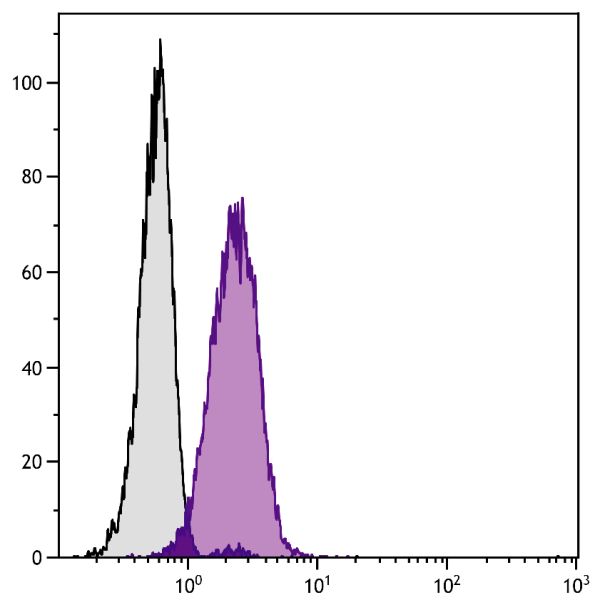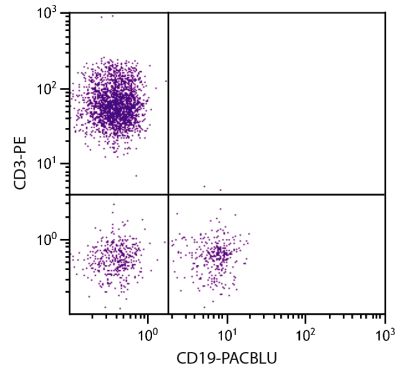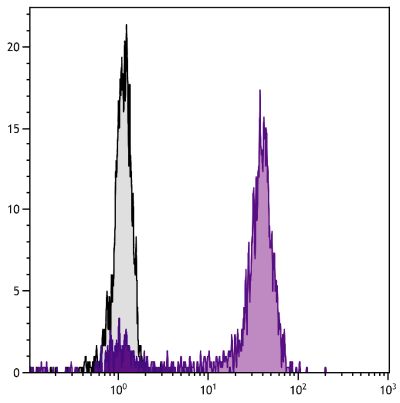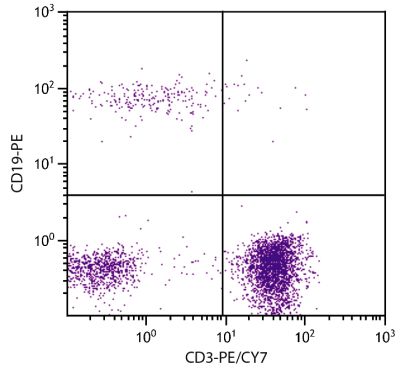Mouse Anti-Human CD11c-PACBLU (3.9)
Cat. No.:
9551-26
Pacific Blue™ Anti-Human CD11c antibody for use in flow cytometry assays.
$272.00


| Clone | 3.9 |
|---|---|
| Isotype | Mouse (BALB/c) IgG1κ |
| Isotype Control | Mouse IgG1-PACBLU (15H6) |
| Specificity | Human/Rhesus/Cynomolgus CD11c |
| Alternative Names | Integrin αX, Axb2, CR4, p150,95 |
| Description | CD11c is a 150 kDa adhesion glycoprotein that associates with β2 integrin to form the CD11c/CD18 heterodimer that binds CD54 (ICAM-1) and fibrinogen. It is expressed on NK cells, a subset of B and T cells, granulocytes, monocytes, and macrophages. It functions in cytotoxic T cell killing and in neutrophil and monocyte adhesion to endothelium. |
| Immunogen | Rheumatoid synovial cells and human monocytes |
| Conjugate | PACBLU (Pacific Blue™) |
| Buffer Formulation | Phosphate buffered saline containing < 0.1% sodium azide |
| Clonality | Monoclonal |
| Concentration | Lot specific |
| Volume | 1.0 mL |
| Recommended Storage | 2-8°C; Avoid exposure to light |
| Trademark Information | Pacific Blue™ is a trademark of Thermo Fisher Scientific, Inc. or its subsidiaries |
| Applications |
Flow Cytometry – Quality tested 2,5-8 Immunohistochemistry-Frozen Sections – Reported in literature 2 Immunoprecipitation – Reported in literature 1 Blocking – Reported in literature 3,4 |
| RRID Number | AB_2796917 |
| Gene ID |
3687 (Human) 100427850 (Rhesus) 102147272 (Cynomolgus) |
| Gene ID Symbol |
ITGAX (Human) ITGAX (Rhesus) ITGAX (Cynomolgus) |
| Gene ID Aliases | CD11C; SLEB6 |
| UniProt ID |
P20702 (Human |
| UniProt Name |
ITAX_HUMAN (Human) |
Documentation
Certificate of Analysis Lookup
Enter the Catalog Number and Lot Number for the Certificate of Analysis you wish to view
- 1. Malhotra V, Hogg N, Sim RB. Ligand binding by the p150,95 antigen of U937 monocytic cells: properties in common with complement receptor type 3 (CR3). Eur J Immunol. 1986;16:1117-23. (IP)
- 2. Tanaka M, Nagai T, Tsuneyoshi Y, Sunahara N, Matsuda T, Nakamura T, et al. Expansion of a unique macrophage subset in rheumatoid arthritis synovial lining layer. Clin Exp Immunol. 2008;154:38-47. (FC, IHC-FS)
- 3. Nasr AB, Haithcoat J, Masterson JE, Gunn JS, Eaves-Pyles T, Klimpel GR. Critical role for serum opsonins and complement receptors CR3 (CD11b/CD18) and CR4 (CD11c/CD18) in phagocytosis of Francisella tularensis by human dendritic cells (DC): uptake of Francisella leads to activation of immature DC and intracellular survival of the bacteria. J Leukoc Biol. 2006;80:774-86. (Block)
- 4. Ihanus E, Uotila LM, Toivanen A, Varis M, Gahmberg CG. Red-cell ICAM-4 is a ligand for the monocyte/macrophage integrin CD11c/CD18: characterization of the binding sites on ICAM-4. Blood. 2007;109:802-10. (Block)
- 5. Shankar SP, Babensee JE. Comparative characterization of cultures of primary human macrophages or dendritic cells relevant to biomaterial studies. J Biomed Mater Res A. 2010;92:791-800. (FC)
- 6. Nishimura T, Onda M, Takao S. CD4+ CD25+ regulatory T cells suppressed the indirect xenogeneic immune response mediated by porcine epithelial cell pulsed dendritic cells. Xenotransplantation. 2010;17:313-23. (FC)
- 7. Moreau A, Hill M, Thébault P, Deschamps JY, Chiffoleau E, Chauveau C, et al. Tolerogenic dendritic cells actively inhibit T cells through heme oxygenase-1 in rodents and in nonhuman primates. FASEB J. 2009;23:3070-7. (FC, Cynomolgus Reactivity)
- 8. O'Doherty U, Ignatius R, Bhardwaj N, Pope M. Generation of monocyte-derived dendritic cells from precursors in rhesus macaque blood. J Immunol Methods. 1997;207:185-94. (FC, Rhesus Reactivity)
See All References






